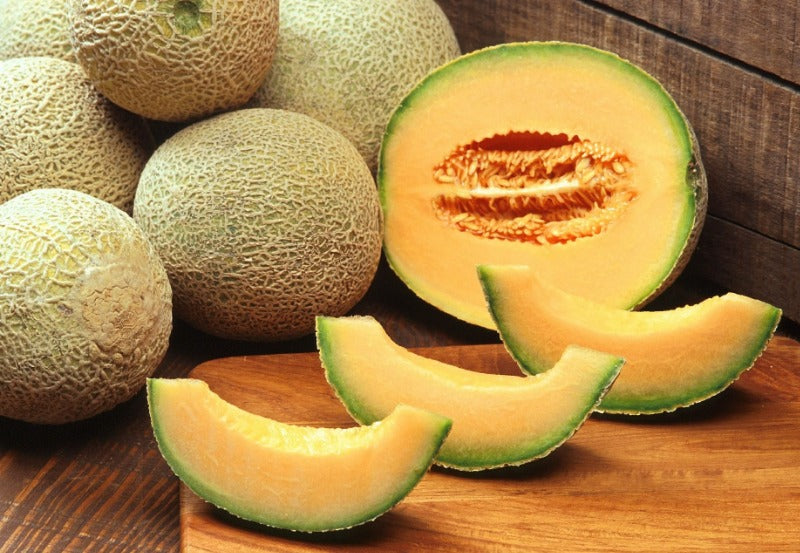This melon is quite delicious, great in fruit salads and on its own. Kids tend to love cantaloupe because of its juicy sweetness, and bearded dragons will love it for the same reason. But sometimes the foods that bearded dragons gobble up aren’t actually good for them. Let’s find out if cantaloupe is on that list. Can bearded dragons eat cantaloupe?
Staple, Treat, or Off Limits: Can Bearded Dragons Have Cantaloupe At All?
Do bearded dragons have the green, yellow, or red light when it comes to eating cantaloupe? The quick answer: Bearded dragons can eat cantaloupe as a rare treat, every few weeks or so.
To understand why, it’s important to look at the nutritional content of cantaloupes and examine any qualities that make it dangerous for bearded dragons to eat on a regular basis.
Cantaloupe has the following beneficial nutrients (you may have heard of a lot of these if you are a big fan of cantaloupe yourself):
Loads of beta-carotene and Vitamin C. Beta-carotene converts to Vitamin A in the body. Basically, like many other fruits, cantaloupe is an excellent source of Vitamins A and C. Your bearded dragon needs these vitamins to see well, fight off illness and disease, grow at a healthy pace, and have healthy reproduction.
Folate. Like broccoli, cantaloupe is a great source of folate, which is important for your dragon’s cells and tissue.

Fiber. Cantaloupe has lots of fiber, which helps digestion flow more smoothly. So if your bearded dragon is suffering from constipation, a little cantaloupe might do the trick. You could also try blueberries, raspberries, grapes, or strawberries. Too much fiber can have negative effects like runny stool, so of course be cautious how many high-fiber foods you feed your dragon.
Almost 90% water. Cantaloupe is almost entirely made out of water, so it can be a great source of hydration. Just don’t feed too much or your dragon will soon have a pretty bad case of diarrhea.
Cantaloupe also has potassium, which regulates bearded dragons’ blood pressure and nerve function, as well as carbohydrates, which provide energy.
Why Can Bearded Dragons Eat Cantaloupe Only As a Treat?
Bearded dragons don’t need fruit every day. It’s more important for them to have lots of vegetables and greens on a daily basis. Even so, there are some fruits bearded dragons can eat more frequently than others because they are nutrient dense and don’t pose a health risk. Examples are apples and grapes. There are several reasons why cantaloupe doesn’t make a good staple fruit for bearded dragons.
Too much sugar. Sugar is the universal quality that makes fruit unsuitable for bearded dragons to eat every day. Fruit in general has a lot of sugar, and cantaloupe is no exception, with 13g in a cup. That’s a decent amount, although many fruits do have more sugar than that.
Pro Tip: Bearded dragons love sugar, which can work in your favor if you have a picky eater. Sprinkle pieces of cantaloupe or other fruit in your beardie's salad to coax him to eat his greens.
Overhydration. Too much water can prevent nutrients from being absorbed into your bearded dragon's bloodstream. Additionally, overhydration causes diarrhea, which can cause dehydration if it goes on for more than a few days. And dehydration can cause a number of other health issues for your beardie.
Too much phosphorus compared to calcium. The all-important ratio of calcium to phosphorus is not ideal in cantaloupes. It’s 1:1.5 in favor of phosphorus, which isn’t horribly off balance—but any time a food has more phosphorus than calcium, you should proceed with caution before feeding it to your bearded dragon. Phosphorus prevents calcium absorption, which is a problem since calcium depletion can cause metabolic bone disease (MBD). MBD attacks a bearded dragon's skeletal system and can become very serious, even life-threatening. A little cantaloupe every once in a while won’t hurt, but cantaloupe on a daily or weekly basis can be dangerous.
How to Serve Cantaloupe for Your Bearded Dragon
When you want to treat your bearded dragon to some cantaloupe, it’s best served ripe and organic. If you aren’t able to get an organic cantaloupe, that’s okay, but as an added precaution you may want to consider washing the cantaloupe before slicing it. You may feel silly washing it when you know you aren’t going to be feeding your dragon the rind, but it just ensures that no pesticides or chemicals make their way onto the fruit.
To serve cantaloupe to your bearded dragon, make sure the peel and seeds are removed. Your bearded dragon can accidentally choke on the seeds, so double check that there are none left on the fruit. Then all you have to do is slice the cantaloupe into very small pieces and feed it with a salad or by itself. Chances are, your beardie will love it!
If you have questions or feedback, please email us at team@dragonsdiet.com








